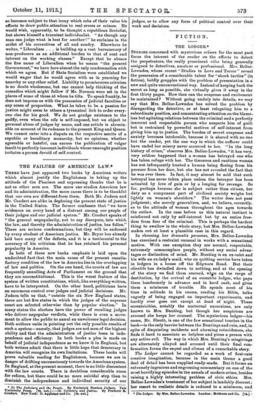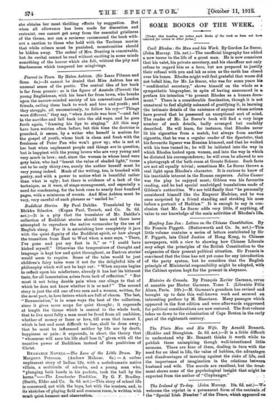FICTION.
THE LODGER• STORIES concerned with mysterious crimes for the most part focus the interest of the reader on the efforts to detect the perpetrators, the really prominent roles being generally assigned to detectives, amateur or professional. Mrs. Belloc- Lowndes, whose recent " Studies in Love and Terror" reveal the possession of a considerable talent for 'shock tactics" (in fiction), boldly grapples with the problem of presentation in a new and quite unconventional way. Instead of keeping back the secret as long as possible, she virtually gives it away in the first thirty pages. How then can the suspense and excitement be maintained ? Without going unduly into details, we may say that Mrs. Belloc-Lowndes has solved the problem by disregarding the detective, or at least relegating him to a subordinate position, and concentrating attention on the blame- less but agitating relations between the criminal and a perfectly innocent and respectable person who suspects him of guilt but is restrained by powerful motives of self-interest from giving him up to justice. The burden of secret suspense and anxiety becomes intolerable, because it is shared with no one but the reader, yet the one way in which the sufferer could have ended her misery never occurred to her. "In the long history of crime," observes Mrs. Belloc-Lowndes, "it has very, very seldom happened that a woman has betrayed one who has taken refuge with her. The timorous and cautious woman has not infrequently hunted a human being fleeing from his pursuer from her door, but she has not revealed the fact that he was ever there. In fact, it may almost be said that such betrayal has never taken place unless the betrayer has been actuated by love of gain or by a longing for revenge. So far, perhaps because she is subject rather than citizen, her daty as a component part of civilized society weighs but lightly on woman's shoulders." The writer does not pasti judgment ; she merely generalizes, and, we believe, correctly, as to the attitude of woman throughout the ages towards the outlaw. In the case before us this natural instinct is reinforced not only by self-interest but by an entire free- dom from fear of the criminal. This is perhaps the hardest thing to swallow in the whole story, but Mrs. Belloc-Lowndes makes out at least a plausible case in this regard.
In choosing her dramatis personae, Mrs. Belloc-Lowndes has exercised a restraint unusual in works with a sensational motive. With one exception they are normal, respectable, extremely commonplace people, without any social advan- tages or distinction of mind Mr. Bunting is an ex-valet and his wife an ex-lady's maid, who on quitting service have taken in lodgers in a house off the Edgware Road. But their clientele has dwindled down to nothing, and at the opening of the story we find them rescued, whin on the verge of destitution, by the arrival of an eccentric lodger, who pays them handsomely in advance and in hard cash, and gives them a minimum of trouble. He spends most of his time in solitude in his rooms, reading his Bible, talks vaguely of being engaged on important experiments, and hardly ever goes out except at dead of night. These eccentricities, notably the nocturnal excursions, are only known to Mrs. Bunting, but though her suspicions are aroused she keeps her counsel. The mysterious lodger—his name, Mr. Sleuth, is one of the few sensational touches in the book—is the only barrier between the Buntings and ruin, and, in spite of disquieting incidents and alarming coincidences, she finds it hard to associate so helpless and pious a person with any active evil. The way in which Mrs. Bunting's misgivings are alternately allayed and aroused until their final con- firmation forms the sequel and climax of a remarkable story.
The Lodger cannot be regarded as a work of first-rate creative imagination, because in the main theme a good deal of detail has been supplied ready-made. But it forms an extremely ingenious and engrossing commentary on one of the most horrifying episodes in the annals of modern crime, besides raising a highly interesting problem of civic ethics. Mrs. Belloc-Lowndes's treatment of her subject is laudably discreet ; her resort to realistic details is reduced to a minimum, and
• The Lodger. By Mrs. Belloc-Lowndes. London: Methuen and Co. [Cs.]
she obtains her most thrilling effects by suggestion. But when all allowance has been made for discretion and restraint, one cannot get away from the essential grisliness of the theme, nor can a reviewer recommend the book with- out a caution to those who hold with the Tacitean maxim that while crimes must be punished, monstrosities should be hidden away. The ordeal of Mrs. Bunting is conceivable, but its recital cannot be read without exciting in some minds something of the horror which she felt, without the pity and fearlessness which tempered her misgivings.















































 Previous page
Previous page